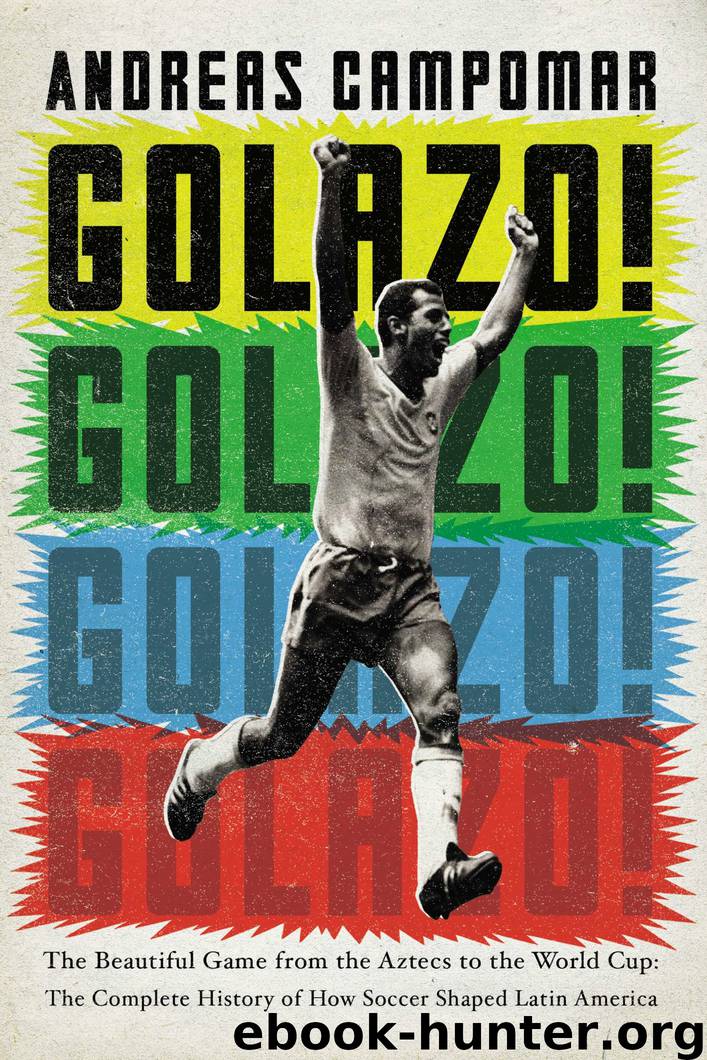Golazo! by Andreas Campomar

Author:Andreas Campomar
Language: eng
Format: epub
Publisher: Penguin Group, USA
Published: 2014-05-05T16:00:00+00:00
Earthquakes in Chile
For a country that had adopted the game so early, Chile’s record in international competition had been poor. The Andean republic had been the second country on the continent to establish an association, two years after Argentina. In 1913, the Asociación de Football de Chile (FAC) had affiliated itself to FIFA, ten years even before Uruguay. And yet in the opening three decades of the Campeonato Sudamericano, Chile never finished higher than the third place they achieved in 1926. The team was similarly unsuccessful in the other competitions the country entered. Although by the 1940s Chile had managed consecutive runner-up spots and had hosted the South American championships five times, the likelihood of its securing the World Cup nomination seemed remote.
In many ways Chile remained an isolated and despondent nation, in spite of her democratic traditions and belief in her exceptionalism. In a speech given at the Ateneo Club at the turn of the century, the politician Enrique Mac Iver brought this unease to the fore: “It seems to me that we are not happy. We note a malaise that is not confined to one class of people nor to particular regions . . . The present is not satisfactory, and the future is cast in shadow.”25 Chileans may have styled themselves as los ingleses de Sudamérica (the English of South America), but for much of the twentieth century the country had been cast in the shadow of its eastern neighbor Argentina.
The 1952 Summer Olympics, held in Helsinki, had given a group of Chilean football executives the idea that the country might have a chance of hosting the World Cup. If the small Scandinavian country of Finland could successfully host the world’s foremost athletic event, then why could Chile not host the most important football tournament? At the thirtieth FIFA Congress in Lisbon in 1956, Argentina seemed to be the insurmountable obstacle to this dream. The Argentines had a far more developed infrastructure—with some of the largest stadiums on the continent—and there was a feeling that, after Uruguay and Brazil had successfully hosted the competition, it was surely their turn. Moreover, few delegates could even place Chile on the map. After a persuasive seventy-minute speech by the president of the AFA, the confident Argentinian delegation abandoned all pretense of humility and made it clear that “we can have the World Cup tomorrow. We have it all.”
With the Chilean delegation’s chances fading, the press in Santiago favored honorable withdrawal rather than the disappointment of failure. If the Argentinians’ presentation was somewhat overblown, the Chileans took the opposite tack. Carlos Dittborn, the eloquent former director of the Universidad Católica, took just fifteen minutes to make his speech. Humility and strength in weakness would prove decisive as Dittborn invoked the amateur spirit upon which FIFA had been founded. Dittborn came out with a phrase that would pass into history: Porque no tenemos nada, queremos hacerlo todo (Because we have nothing, we want to do it all). It was a very Chilean remark.
Download
This site does not store any files on its server. We only index and link to content provided by other sites. Please contact the content providers to delete copyright contents if any and email us, we'll remove relevant links or contents immediately.
The Daily Stoic by Holiday Ryan & Hanselman Stephen(3317)
The Fate of Rome: Climate, Disease, and the End of an Empire (The Princeton History of the Ancient World) by Kyle Harper(3067)
People of the Earth: An Introduction to World Prehistory by Dr. Brian Fagan & Nadia Durrani(2736)
Ancient Worlds by Michael Scott(2685)
Babylon's Ark by Lawrence Anthony(2676)
The Daily Stoic by Ryan Holiday & Stephen Hanselman(2574)
Foreign Devils on the Silk Road: The Search for the Lost Treasures of Central Asia by Peter Hopkirk(2464)
India's Ancient Past by R.S. Sharma(2454)
MOSES THE EGYPTIAN by Jan Assmann(2416)
The Complete Dead Sea Scrolls in English (7th Edition) (Penguin Classics) by Geza Vermes(2283)
The Earth Chronicles Handbook by Zecharia Sitchin(2229)
Lost Technologies of Ancient Egypt by Christopher Dunn(2225)
24 Hours in Ancient Rome by Philip Matyszak(2084)
Alexander the Great by Philip Freeman(2065)
Aztec by Gary Jennings(2028)
The Nine Waves of Creation by Carl Johan Calleman(1917)
Curse Tablets and Binding Spells from the Ancient World by Gager John G.;(1861)
Before Atlantis by Frank Joseph(1850)
Earthmare: The Lost Book of Wars by Cergat(1825)
